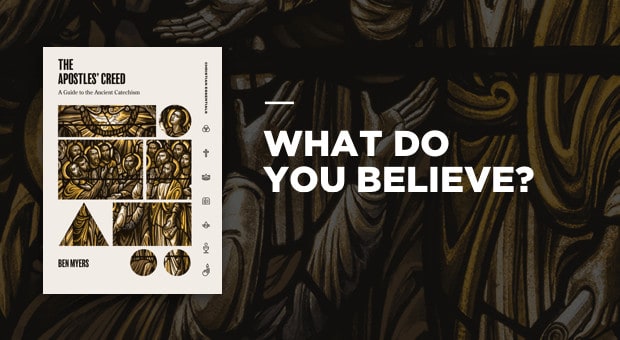“The truest and most important things we can ever say are not individual words but communal words.”
People today are flooded with opinions and ideas. And they all might be interesting, but are they true? In an era of individualism, pundits, and social media, it can seem important to form opinions and ideas to remain set apart from the crowd. But are those opinions and ideas built on a solid foundation? Or are they merely echoes of the surrounding culture ?
In his new book The Apostles’ Creed: A Guide to the Ancient Catechism, Ben Myers reintroduces the Apostles’ Creed and shows how it provides Christians with a strong framework for Christian thinking and belief. He addresses this idea of communal words holding power in this excerpt from the first chapter:
In the same way, Christians today are often suspicious of creeds. Many churches are more comfortable with mission statements than with creeds. The thing about a mission statement is you always get to make it up for yourself. It’s like writing your own wedding vows.
But here’s the paradox. It is the individualized confession, like the personalized wedding vow, that ends up sounding like an echo of the wider society. What could be more conformist than expressing your feelings of love through your own specially crafted wedding vow? The wedding is a grand occasion, so you want to make it special: but the more you try to personalize it, the more it degenerates into triviality and cliché. The ceremonial quality evaporates. Or again, what could be more conformist than a mission statement? Every company has one. And although each one is unique, they all sound eerily similar, as if all the companies in the world were out to achieve the same blandly generic aims. I think there is a similar dynamic at work in many churches today. The harder they try to be special and unique, the more they seem exactly like everybody else.
By contrast, to confess the creed is to take up a countercultural stance. When we say the creed we are not just expressing our own views or our own priorities. We are joining our voices to a great communal voice that calls out across the centuries from every tribe and tongue. We locate ourselves as part of that community that transcends time and place. That gives us a critical distance from our own time and place. If our voices are still echoes, they are now echoing something from beyond our own cultural moment.
The truest and most important things we can ever say are not individual words but communal words. Most of the words of my life are trivial and fleeting. They fall from my lips and drift away like dead leaves. But in the creed I am invited to say true words. In confessing the faith of the church, I allow my own individual “I” to become part of the “I” of the body of Christ. It is then that I am saying something of deep and lasting importance. It is then that my words have roots.”
You recite it. But do you understand it? The Apostles’ Creed has united Christians from different times, places, and traditions. Pick up this meditation on the essential guide to the basics of the Christian life today.





